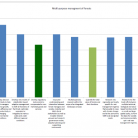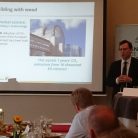Tag: RIA 2.5

September 14, 2017
NSG Austria ranks priorities for its national research and innovation
In an exemplary initiative, the Austrian forest-based sector has identified top research and innovation areas (RIAs) to concentrate its advocacy efforts upon. During 2016, the Austrian forest-based sector will focus its efforts to “Improve the reusability and recyclability of wood composites and construction materials” (RIA 2.5E), as well as in “Try out new business models […]
September 13, 2017
The BBI JU Call 2017 will release € 81 million of funding for the European biobased industries
The BBI JU Call 2017 of the Bio-based Industries Joint Undertaking (BBI JU) features several topics relevant for the forest-based sector, falling under the areas of the FTP Strategic Research and Innovation Agenda. Out of 16 topics covering all possible types of actions, FTP has identified topics that address activities within ‘Integrated biorefinery concepts’ (RIA […]

Unleashing the full power of research and innovation
FTP seeks to align public funding for research and innovation with proper technological developments to reduce GHG emissions and improve forest management and land use With its unique innovation portfolio and many technological solutions, the forest-based sector can foster the transition to a reliable, sustainable and competitive energy system and contribute to reducing the emission […]

February 15, 2018
2.5 Resource-efficient use, reuse and recycling systems
Rationale Wood and wood-based products have the potential to be re-used repeatedly as raw material. Waste from harvesting operations and wood processing is regularly used as high-value raw material for other types of processing. Low-value treetops and branches, stumps and roots, crude tall oil and other first and second generation biorefinery products contain chemically-attractive components […]
January 5, 2019
Societal Challenge 5
Climate Action, Environment, Resource Efficiency and Raw Materials The specific objective of the Work Programme Societal Challenge 5 (SC5) is to develop a resource-efficient economy that is resilient to climate change, together with a sustainable supply of raw materials, in order to meet the needs of a growing global population within the sustainable limits of […]
Societal Challenge 3
Secure, Clean and Efficient Energy The specific objective of the Work Programme Societal Challenge 3, as described in Horizon 2020, is to make the transition to a reliable, sustainable and competitive energy system, in the context of increasingly-scarce resources, growing energy needs and climate change. Updated on a biannual basis, the Work Programme Societal Challenge […]
August 1, 2017
Nanotechnology
Nanotechnology is the manipulation of matter on an atomic and molecular scale. Generally, nanotechnology works with materials, devices and other structures with at least one dimension sized from 1 to 100 nanometres. Quantum mechanical effects are important on this quantum-realm scale. Nanotechnology as a spectrum of evolving techniques has a revolutionary impact on the areas […]
Information and Communication Technology (ICT)
Information and communications technology (ICT), is often used as an extended synonym for information technology (IT), but is a more specific term that stresses the role of unified communications and the integration of telecommunications, computers and the necessary software and audiovisual systems that enable users to access, store, transmit, and process information. ICT underpins innovation […]
Biotechnology
Biotechnology is the use of living systems and organisms to develop or make useful products. The forest-based sector uses biotechnology in many processes today and this is expected to increase as the sector evolves to become a cornerstone of Europe’s future bio-society. Examples of current uses include process water treatment with microbes and the use […]
Advanced manufacturing and processing technologies
Improving resource efficiency and reducing CO2 emissions is vital to increase the competitiveness of the forest-based industries and expand the markets for their products. Manufacturing and processing technologies that significantly reduce energy input and optimise energy management are integral to resource efficiency in the value chain, alongside recovery systems for resource-efficient harvesting, treatment and drying […]

